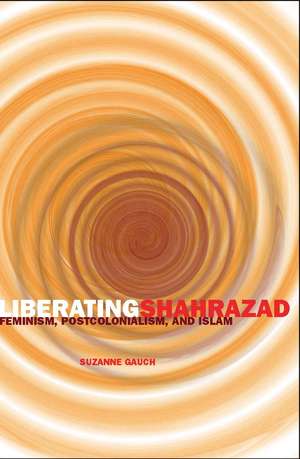Liberating Shahrazad: Feminism, Postcolonialism, and Islam
Autor Suzanne Gauchen Limba Engleză Paperback – 7 dec 2006
Shahrazad, the legendary fictional storyteller who spun the tales of the 1,001 Arabian Nights, has long been rendered as a silent exotic beauty by Western film and fiction adaptations. Now, she talks back to present a new image of Muslim women.
In Liberating Shahrazad, Suzanne Gauch analyzes how postcolonial writers and filmmakers from Algeria, Morocco, and Tunisia have reclaimed the storyteller in order to portray Muslim women in ways that highlight their power to shape their own destinies. Gauch looks at Maghrebian works that incorporate Shahrazad’s storytelling techniques into unexpected and unforeseen narratives. Highlighting the fluid nature of storytelling, Gauch demonstrates how these new depictions of Shahrazad—from artists such as Moufida Tlatli, Fatima Mernissi, Tahar Ben Jelloun, Assia Djebar, Leïla Sebbar—navigate the demands of a global marketplace, even as they reshape the stories told about the Islamic world.
In the face of both rising fundamentalism and proliferating Western media representations of Arab and Muslim women as silent, exploited, and uneducated victims, Gauch establishes how contemporary works of literature and film revive the voice of a long-silenced Shahrazad—and, ultimately, overthrow oppressive images of Muslim women. Suzanne Gauch is assistant professor of English and women’s studies at Temple University.
In Liberating Shahrazad, Suzanne Gauch analyzes how postcolonial writers and filmmakers from Algeria, Morocco, and Tunisia have reclaimed the storyteller in order to portray Muslim women in ways that highlight their power to shape their own destinies. Gauch looks at Maghrebian works that incorporate Shahrazad’s storytelling techniques into unexpected and unforeseen narratives. Highlighting the fluid nature of storytelling, Gauch demonstrates how these new depictions of Shahrazad—from artists such as Moufida Tlatli, Fatima Mernissi, Tahar Ben Jelloun, Assia Djebar, Leïla Sebbar—navigate the demands of a global marketplace, even as they reshape the stories told about the Islamic world.
In the face of both rising fundamentalism and proliferating Western media representations of Arab and Muslim women as silent, exploited, and uneducated victims, Gauch establishes how contemporary works of literature and film revive the voice of a long-silenced Shahrazad—and, ultimately, overthrow oppressive images of Muslim women. Suzanne Gauch is assistant professor of English and women’s studies at Temple University.
Preț: 211.35 lei
Nou
Puncte Express: 317
Preț estimativ în valută:
40.45€ • 41.97$ • 33.81£
40.45€ • 41.97$ • 33.81£
Carte tipărită la comandă
Livrare economică 18 martie-01 aprilie
Preluare comenzi: 021 569.72.76
Specificații
ISBN-13: 9780816648832
ISBN-10: 0816648832
Pagini: 224
Dimensiuni: 150 x 229 x 15 mm
Greutate: 0.29 kg
Ediția:First edition
Editura: University of Minnesota Press
Colecția Univ Of Minnesota Press
ISBN-10: 0816648832
Pagini: 224
Dimensiuni: 150 x 229 x 15 mm
Greutate: 0.29 kg
Ediția:First edition
Editura: University of Minnesota Press
Colecția Univ Of Minnesota Press
Recenzii
“Shahrazad has staged a comeback. But this legendary storyteller is not the desperate, wily victim of a murderous tyrant that Western writers have depicted. Instead, in recent Maghrebian versions, she is a powerful Arab woman representing other powerful women with alternative visions for their society—women who are not afraid to speak truth to power. Pointing out that storytelling is intricately bound up with violence and identity, freedom and survival, Gauch examines the ways in which contemporary Arab Muslim women’s voices are made possible and effective. This is an engaging study of Francophone North African intellectuals’ various invocations of this medieval muse.” —Choice
“Drawing on a rich variety of texts, Gauch has assembled an erudite, multifarious compilation of critical analysis and cultural knowledge. Liberating Shahrazad is a model of scholarly pursuit—required reading not only for those interested in Islamic patrimony and culture but also for anybody seeking insight into North African literature.” —Women’s Review of Books
“Cogently articulated, well supported, and convincing. This scholarly work will appeal to a wide-ranging audience in comparative literature, literary and film studies, women’s studies, and francophone studies.” —Research in African Literatures
